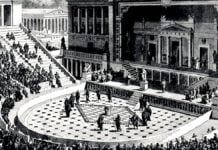Formalism is a school of literary theory and criticism that focuses on the formal elements of a text —such as its structure, language, style, and use of literary devices —rather than its content, historical context, or authorial intent. Formalists believe that the meaning of a literary work is derived primarily from its form and that close reading is necessary to understand how a text operates as a work of art. They pay particular attention to the use of language, the organisation of narrative, and the patterns within a text that create aesthetic effects.
Formalism emerged in the early 20th century, with Russian Formalism being a notable branch. Key figures in this movement, such as Viktor Shklovsky and Roman Jakobson, emphasised the autonomy of literary texts and rejected the idea that literature merely reflects reality or the author’s personal experience. Formalists argue that a text’s structure and use of literary techniques make it “literary.”
- Emphasis on the “literariness” of texts
- Focus on how language is used in literature
- Rejection of biographical and historical approaches to literature
- Analysis of literary devices and structures
Foregrounding and Backgrounding
Foregrounding is a key concept in Formalism, referring to the way certain elements of a text are emphasised or made more prominent, often through unusual use of language or stylistic devices. This can include deviations from everyday language, striking metaphors, repetition, or unusual syntax that draws the reader’s attention to the form of the language itself. Foregrounding disrupts automatic, habitual ways of perceiving the world, forcing the reader to engage more consciously with the text.
- Highlighting specific linguistic or literary features
- Can be achieved through unusual language use, repetition, or structural devices
- Draws the reader’s attention to particular aspects of the text
Backgrounding, in contrast, refers to the elements of the text that are not highlighted but serve as a backdrop to the foregrounded features. Background elements typically conform to established norms or expectations, while the foregrounded elements stand out because they diverge from these norms. The interplay between foregrounding and backgrounding helps shape the reader’s interpretation of the text, as the foregrounded features often carry symbolic or thematic significance.
- Elements that are not emphasised
- Often includes conventional language use or expected narrative structures
- Provides contrast to foregrounded elements
Literariness
Literariness is a term used by Formalists to describe the distinctive qualities that make a text “literary.” It refers to the aspects of a work that distinguish it from ordinary, non-literary language. Literariness is achieved through literary devices like rhyme, rhythm, metaphor, imagery, and irony, transforming everyday language into something special, unique, or aesthetic.
According to Formalist theory, literariness is not tied to the content of a text but rather to its form and style. The degree of literariness depends on how much a text deviates from standard language to create new meanings or evoke emotional or intellectual responses in the reader.
- Use of literary devices (metaphor, alliteration, etc.)
- Heightened attention to language
- Self-reflexivity (drawing attention to its own construction)
- Deviation from everyday language norms
Defamiliarisation
Defamiliarisation (or ostranenie) is one of the central concepts of Russian Formalism, introduced by Viktor Shklovsky. It refers to the process by which literary language makes the familiar strange to make the reader perceive the world differently. By disrupting habitual ways of thinking or seeing, defamiliarisation forces the reader to reconsider everyday objects, ideas, or experiences in a new light.
For example, everyday objects or events in literature might be described in such an unusual or surprising way that the reader is forced to pay attention to them more closely. This technique is used to shake readers out of automatic perception and encourage a fresh perspective. Defamiliarisation enhances the aesthetic experience of literature, making readers more aware of the artistry of creating the text.
- To challenge readers’ perceptions
- To renew the reader’s perception of the ordinary
- To extend the process of reading and interpretation
Metaphor
In Formalism, metaphor is recognised as a powerful literary device that compares two unrelated things, suggesting that one thing is another. This comparison is figurative rather than literal, often used to highlight similarities between concepts or to evoke complex emotional responses. For example, “Time is a thief” is a metaphor that compares time to a thief, suggesting that it steals moments from our lives.
Formalists view metaphor as a key technique in achieving literariness, as it often deviates from ordinary language and invites deeper interpretation. Through metaphor, authors can create layers of meaning, making the familiar seem unfamiliar or highlighting underlying truths about the human experience.
- Creates new meanings by combining disparate concepts
- Central to poetic language
- Can provide fresh insights or perspectives
Metonymy
Metonymy, another important literary device in Formalism, is a figure of speech in which one thing is represented by another closely related or associated with it. Metonymy relies on a direct or logical connection, unlike metaphor, which draws on the similarity between two things. For instance, using “the crown” to refer to a monarchy or “the White House” to represent the U.S. government are examples of metonymy.
In Formalist analysis, metonymy is often contrasted with metaphor, as both are central to how literary texts construct meaning. Metonymy can create a sense of proximity or association, making it a powerful tool for developing symbols or reinforcing themes within a narrative.
- Based on contiguity rather than similarity
- Often used for rhetorical effect
- Can create a sense of immediacy or concreteness
Fabula and Syuzhet
Fabula and Syuzhet are terms used by Russian Formalists, particularly by Viktor Shklovsky and his contemporaries, to differentiate between the raw material of a story and the way that material is structured or presented in the narrative.
Fabula refers to the chronological sequence of events in a story. It is the underlying “what happens” in the narrative, independent of how it is told.
- The chronological sequence of events in a narrative
- The raw material of the story
Syuzhet, on the other hand, is the specific arrangement of those events within the narrative. It refers to the “how” of storytelling—the structure, order, and pacing chosen by the author to present the events to the audience.
- The way the story is actually told
- The arrangement of events in the narrative
- Can involve flashbacks, flash-forwards, or other non-chronological structuring
For example, in a novel where the story is told in non-linear flashbacks, the fabula would be the events in their chronological order, while the syuzhet would be the order in which the author presents these events to the reader. The distinction between fabula and syuzhet allows Formalists to analyse how a narrative’s structure influences its meaning and impact.
Formalism, emphasising the formal properties of literature, offers a framework for understanding how texts create meaning through structure, language, and literary devices. Concepts such as foregrounding, defamiliarisation, metaphor, and metonymy highlight how literature transforms ordinary language into something aesthetically and intellectually engaging. By differentiating between fabula and syuzhet, Formalists also emphasise the importance of narrative structure in shaping a reader’s experience of a text. Through this focus on form, Formalism offers a way to appreciate literature as an art form that operates independently of its content or social context.





























